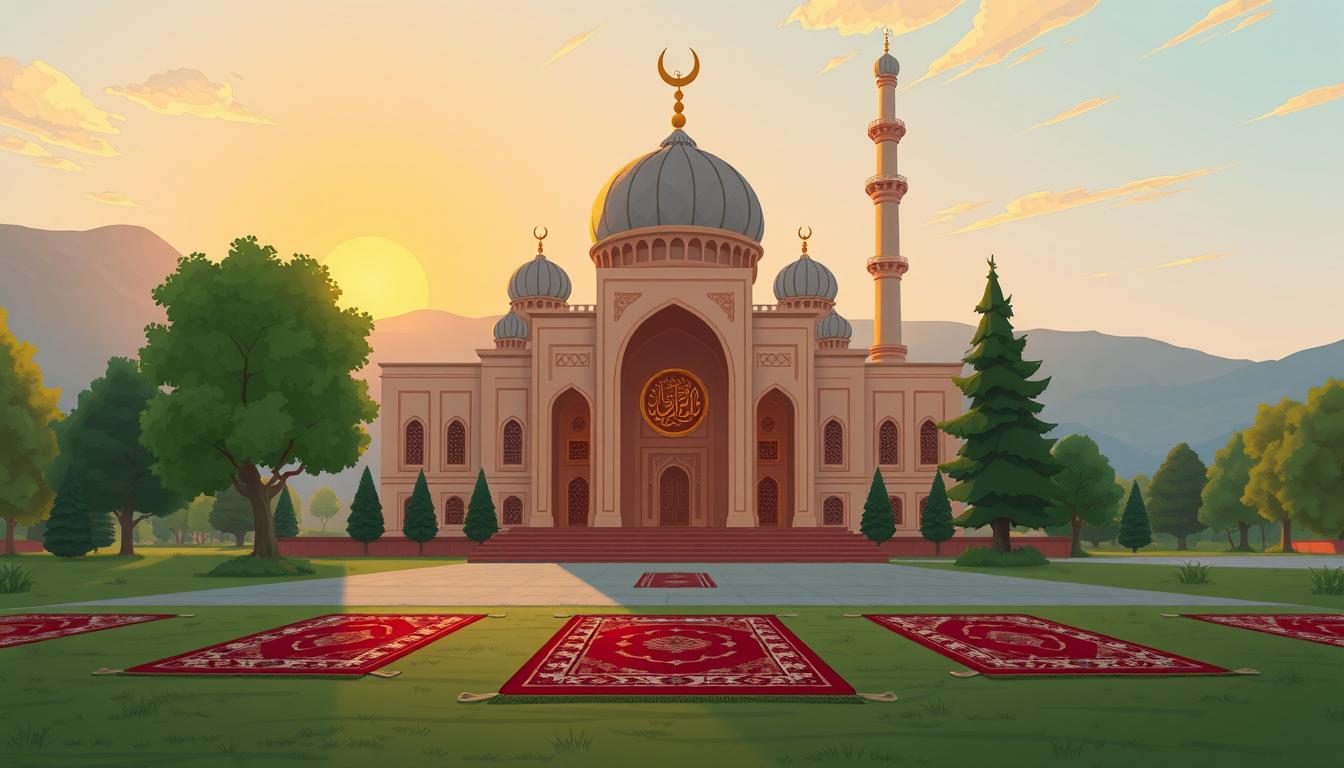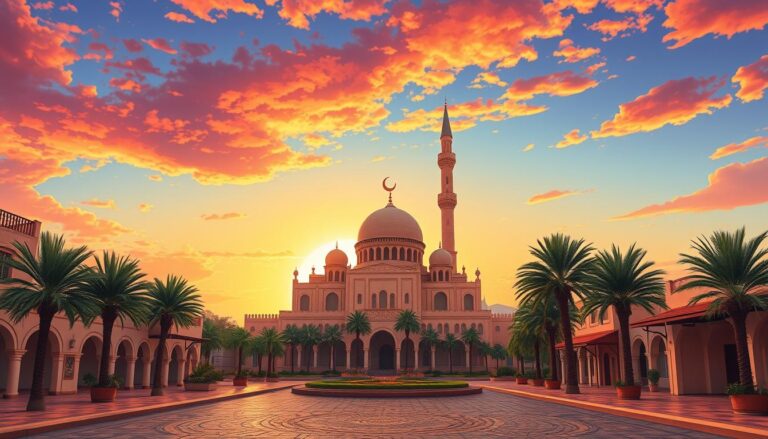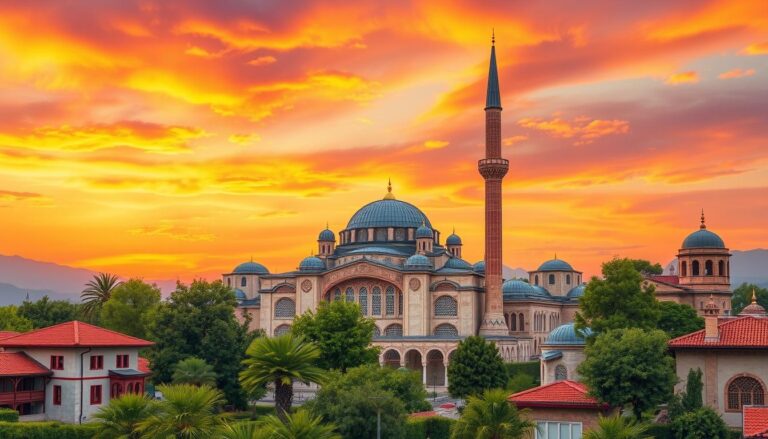Islam in Turkmenistan
A 2009 Pew Research Center report found that 93.1% of Turkmenistan’s people are Muslim. The Turkmen, like those in Uzbekistan and Afghanistan, are mostly Sunni Muslims. Shia Muslims are rare, and the Shia practices of Azerbaijani and Kurdish minorities are not politicized.
The majority of Turkmen see themselves as Muslims. They believe Islam is a big part of their culture.
Introduction to Islam in Turkmenistan
Turkmenistan, a Central Asian nation, has a rich and diverse religious landscape. About 93% of the population is Sunni Muslim. The remaining 6.4% are Eastern Orthodox Christians. The rest, 0.6%, belong to other minority faiths.
Overview of Turkmenistan’s Religious Demographics
The religious demographics of Turkmenistan show its history and evolution. Sunni Islam was introduced in the 9th and 10th centuries. Sufi shaykhs helped blend Islamic beliefs with local customs.
The Historical Roots of Islam in Turkmenistan
The history of Islam in Turkmenistan is tied to the Turkmen people’s culture. As they migrated, they adopted Islam, making it a key part of their identity. Turkmeniçilik (Turkmen identity) and Musulmançilik (Muslim identity) are closely linked, showing Islam’s role in shaping Turkmen culture.
“The state actively privileges a form of traditional Islam in Turkmenistan, promoting a singular form of ‘Turkmen Islam’ that is tightly bound to national identity.”
The Influence of Sunni Islam
Sunni Islam deeply influences Turkmen culture and identity. About 89% of Turkmen people follow Sunni Islam. The “holy” tribe called övlat is part of the Turkmen tribal structure. It combines the ancestor cult with Sufism.
Each tribe believes they descend from Prophet Muhammad through the Four Caliphs. This gives them a special, sacred status among the Turkmen.
Turkmen Affiliation with Sunni Islam
Islam reached the Turkmen mainly through Sufi shaykhs, not mosques. These holy men helped mix Islamic beliefs with old traditions. They became “patron saints” for certain clans or tribes.
This blend of Sunni Islam and Turkmen culture has shaped their strong identity today.
The Role of Sufism in Turkmen Islam
Sufism, Islam’s mystical side, greatly impacts Turkmen beliefs and practices. Sufi orders and rituals are part of Turkmen life. Sufi shrines and saints are key in Turkmen Sunni Islam.
Sufism’s influence has made Turkmen Sunni Islam unique. It combines with the country’s nomadic and tribal heritage.
“The symbiosis of Sunni Islam and Turkmen tribal culture has contributed to the strong Turkmen Sunni identity that persists today.”
Islam in the Soviet Era
During the Soviet era, Islam in Turkmenistan faced a lot of suppression. The communist authorities saw all religious beliefs as old-fashioned “vestiges of the past.” They banned most religious schooling and observance. Also, they closed down most mosques across the country.
The Soviet government set up a Muslim Board in Central Asia, based in Tashkent. But, this board was more about spreading propaganda than being a real religious leader.
Preservation of Folk Islam
Even with the strict rules against organized religion, some Islamic traditions survived in rural areas. Muslim burial rituals and male circumcision were kept alive. They were practiced in a way that wasn’t officially recognized by the state.
“Some religious customs, such as Muslim burial and male circumcision, continued to be practiced throughout the Soviet period, but most religious belief, knowledge, and customs were preserved only in rural areas in ‘folk form’ as a kind of unofficial Islam not sanctioned by the state-run Spiritual Directorate.”
This harsh treatment of religious practices and the closure of mosques led to a unique Folk Islam in Turkmenistan. Here, people kept their religious customs and beliefs alive, mostly outside of state control.
The ability to keep these traditions alive during the Soviet era helped Islam in Turkmenistan grow again after the country became independent.
Islam in Turkmenistan
Since gaining independence, Islam in Turkmenistan has seen a big comeback. Mosques and churches have reopened, and some Protestant groups can now operate. But, the government still controls religious life closely, picking the mufti and approving what books can be brought in.
The 1995 census showed that about 77% of Turkmenistan’s 5 million people are ethnic Turkmen. Almost all of them, around 95%, follow Sunni Islam. There are also Shi’a Muslims and followers of other faiths like Russian Orthodox Christianity and Protestantism.
Under the Soviets, only four mosques were allowed to function. But since 1991, this number has jumped to about 320 mosques today. The Russian Orthodox Church also has a presence, with 11 churches, including three in Ashgabat.
Even with more mosques and churches, the government still controls religious life. Groups must register with the government, which is hard to do. Unregistered groups, like Roman Catholics and Jews, often face trouble from the authorities.
“The government of Turkmenistan has maintained tight control over religious activities, limiting the ability of minority faiths to operate freely.”
In short, Islam’s role in Turkmenistan is complex. There’s a rise in religious practices since independence, but the government still limits freedom. The Sunni Muslim majority has a big impact on culture, while the government tries to balance religious freedom with its own goals.
The Revival of Islam After Independence
After gaining independence from the Soviet Union, Turkmenistan has worked to revive its Islamic heritage. This revival of Islam in Turkmenistan includes the reopening of mosques and other religious sites. The government also plays a big role in controlling and regulating religious activities.
Reopening of Mosques and Religious Institutions
With the end of Soviet rule, more religious institutions have popped up in Turkmenistan. These include mosques and religious schools. They were built with help from countries like Saudi Arabia, Kuwait, and Turkey.
These places now offer classes in Arabic, Quran studies, and Islamic history. Students can learn a lot about Islam here.
Government Control and Regulation of Islam
The Turkmenistan government keeps a close eye on Islamic practices and institutions. The country’s Muslim Religious Board works closely with Uzbekistan’s board. They are based in Tashkent.
The government also has a Ministry of Justice that registers Islamic judges. A council under the Cabinet of Ministers watches over the clergy’s activities.
Even though mosques and schools have reopened, the government’s strict control is clear. This shows that Islam’s role in Turkmenistan is still complex and nuanced.
Cultural Assimilation and Minority Rights
Turkmenistan’s government says it supports religious freedom, as shown in the 1991 Law on Freedom of Conscience. But, it can choose who teaches religion or is a clergy member. This shows the tricky mix of cultural assimilation and minority religious rights in the country.
Minority groups in Turkmenistan include Uzbeks, Russians, and Kazakhs. The main languages are Turkmen, Russian, and Uzbek. Sunni Muslims are the majority, but there are also Shi’a Muslims, Jehovah’s Witnesses, Jews, and Evangelical Christians.
The “Turkmenization” policy helps Turkmen people in education and jobs. But, it limits opportunities for others. Minority groups face big challenges in politics, with Turkmen people leading most positions.
“The government of Turkmenistan continues to restrict minority groups from accessing educational, training, employment, and political opportunities.”
The government controls religious places, closing many mosques and churches. Only 118 are registered in 2022. This limits minority groups’ freedom to practice their faith.
Despite these issues, Turkmenistan has tried to help minority communities. In 2005, it reported to the Committee on the Elimination of Racial Discrimination. Also, over 16,000 refugees and stateless people got citizenship.
The balance between cultural assimilation and minority religious rights is still a big challenge in Turkmenistan. It needs ongoing talks and efforts to protect everyone’s basic freedoms.
Challenges and Restrictions on Religious Freedom
In Turkmenistan, the government puts a lot of restrictions on religious freedom. The 2016 Religion Law makes it hard for religious groups to register. They need at least 50 adult citizen founders. Any group not registered is not allowed to meet or get foreign money.
The law also stops worship in private homes and private religious education. The government can pick and choose who teaches religion. They also control who can bring in religious literature.
Registration Requirements for Religious Groups
Religious groups in Turkmenistan face big hurdles to register. The rules are strict, making it hard for small groups to meet them. This makes it hard for them to practice their faith freely.
Limitations on Religious Literature and Education
The government limits religious literature and education a lot. They must approve any religious books or materials. This means people can’t get many religious texts. Also, only basic religious education is allowed, in places of worship or government training.
These religious freedom restrictions make it tough for people to practice their faith. The government’s control over religious activities and education limits the right to religious freedom in Turkmenistan.
The Role of Islam in Contemporary Turkmen Society
Islam has been a key part of Turkmen identity for centuries. It is deeply woven into the nation’s culture. Most Turkmen see themselves as Muslims, seeing Islam as a big part of their heritage.
In the last ten years, Islam has become even more important. More people, from all walks of life, are embracing Islamic practices.
Islam as a Cultural Identity
The government of Turkmenistan supports a special form of Islam. It combines traditional practices with respect for elders, saints, and Sufi teachings. This mix has made Islam a central part of Turkmen culture.
The Growing Popularity of Islamic Practices
In Turkmenistan, more people are following Islamic traditions. Giving Arabic and Islamic names to newborns is common. Even famous people like pop stars and artists are encouraging this.
Fasting during Ramadan is also becoming more popular. This is true for both regular people and the elite.
“Islam has become a rallying point for Turkmen, unifying the nation under a shared cultural and spiritual identity.”
The government tries to control religious activities while keeping the country secular. But this hasn’t stopped the growing interest in Islam. Turkmenistan’s mix of national identity and religious practices is constantly changing, shaping today’s society.
Conclusion
The story of Islam in Turkmenistan is one of resilience and adaptation. Despite the Soviet era’s suppression and early independence’s challenges, Islam has come back strong. It has become a key part of Turkmen society.
The younger generation’s growing interest in Islamic practices has caught the government’s attention. They see it as a way to boost their own power.
As Turkmenistan faces economic and political troubles, Islam’s role is more important than ever. The government controls religious activities tightly. Yet, the Turkmen people want to keep their Islamic heritage alive.
This shows that Islam will likely remain a big part of Turkmenistan’s future.
In summary, the Conclusion of this article highlights the key points about Islam in Turkmenistan. It covers its history, its comeback, and its impact on the country’s society, politics, and culture.
Source Links
- The Revival of Islam in Turkmenistan
- Religion in Turkmenistan
- Religion and the Secular State in Turkmenistan – Silk Road Paper
- Religion In Turkmenistan
- Turkmenistan – United States Department of State
- Turkmenistan | People, Geography, Government, & History
- Turkmenistan Keeps Lid On All Things Islam
- Islam in Turkmenistan
- Islam in the Soviet Union
- Turkmenistan
- Freedom of Religion in Turkmenistan
- Central Asian History – Khalid: post-Soviet Islam
- Turkmenistan
- The Rise of Political Islam in Soviet Central Asia
- Turkmenistan – Minority Rights Group
- World Report 2006: Rights Trends in Turkmenistan
- Turkmenistan – United States Department of State
- Turkmenistan-Religious-Freedom-proof-2.indd
- Religion and the Secular State in Turkmenistan
- ISLAM IN TURKMENISTAN | Facts and Details
- Turkmenistan – United States Department of State
- TURKMENISTAN: Raids, literature seizures, imam detained
- BTI 2024 Turkmenistan Country Report







